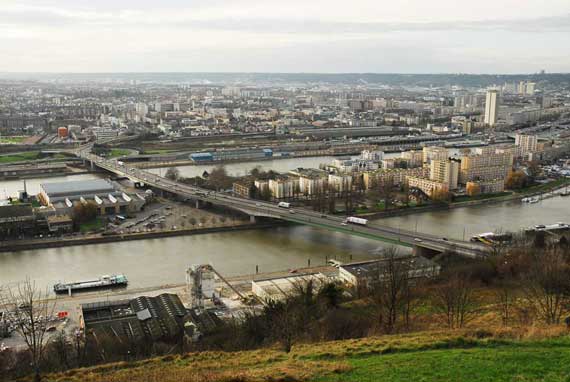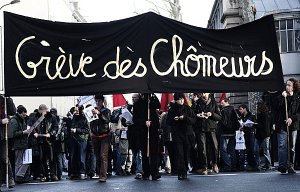Rouen: 24 hours of all sorts of blockades and demos. [original]
From now on, each day at 11 in front of the prefecture, the different sectors in struggle [secteurs en lutte] assemble to organise blockades [actions de blocages.]
Wednesday the 13th: the assembly turned into a demonstration which blocked successively (and briefly) two bridges.
In the afternoon, around 200 people (train drivers, postmen, hospital workers, electricians, students, teachers etc) blocked the eastern industrial zone for an hour.
Thursday the 14th: at 5 am the sorting office was blocked for more than two hours, with the aim of preventing the lorries from leaving to distribute the post to the smaller offices. The students and railway workers went to support the struggling postmen.
At 11 am the interprofessional assembly was cut short by the arrival of masses of lyceens[1]. Many high schools were blockaded in the morning. At one of them the police intervened, making some arrests.
At this assembly it was decided to leave all together in order to go and interrupt the Europe 1 [2] live radio broadcast (live in Rouen today) with the aim of broadcasting our own message [prendre parole a l’antenne].
The heterogenous cortege was invited to follow the CGT’s truck towards Place de la Pucelle (where Europe 1’s tent had been pitched) which proved to be protected by numerous CRS. An soon as the place came into view, a group of lyceens set off towards it, as planned. Eggs were thrown at the police. During this time the sound-system lead the rest of the demo a little further on, where they all dispersed: contrary to what had been announced those who were leading the demo visibly didn’t intend to go to the agreed destination.
At 1 pm, as announced in the morning, a blockade was installed (by more than a hundred people) at a fuel depot. The nearest refinery is one of the 10 refineries on strike in France (the two not striking not in any case receiving crude oil from the ports.re-write this) Production was stopped. The region was therefore supplied by the small reserves of the fuel depot. To stop the lorries entering this depot therefore amounted to depriving the petrol stations of their last supplies. After an hour of blockade, it was suggested to stay all day – and even all night. Against this idea another was proposed: to reimpose the blockade later to allow us time to organise materially. We still didn’t know if this ‘later’ would happen or not – but nothing could be decided, and the blockade was lifted around 6 pm.
There are other meetings planned for the days to come.
Indymedia Nantes,14th October 2010.

The bridge periodically barricaded by guys in Rouen lately.
Rouen, October 15th: Blockades of roads, bridges, petrol depots… [original]
Today, October 15th, the movement carried on in Rouen.
4 am: Start of a blockade of the fuel depot. The blockade started yesterday afternoon but was lifted for the night. This morning it was the truck drivers who’d just come on strike who initiated the blockade. They were quickly joined by workers from different sectors and many strudents. The truckers left to block another depot just next door.
8 am: a blockade was organised by students close to the university of Mont-Saint-Aignan. The idea: to block the road from the bottom of the bottom of the valley, main route of access to the uni from town. Forty people undertook the action: tree trunks were dragged onto the road, along with palettes and tyres. The fires were lit. Tracts were distributed to drivers – who turned around – or to people who parked their cars and climbed by foot. The participants left the blockade towards the end of an hour, leaving the barricade and setting fire to the piles of tyres before they left.
11 am: Since the last few days the interprofessional assembly has been systematically attended by lyceens. That’s to say that where before we had to block Mathilde bridge with 300, now we find ourselves heading there with 2000. A cortege [3] (evidently, like everywhere in France) lively and worked up: that runs, drags, blocks, throws, hurls, leaves the agreed route etc. Nevertheless the demonstraters arrive at Mathilde road bridge (which has 4 lanes), which they invade. A huge mess right at the heart of the circulation system. From now on the lyceens lead the cortege. Later, at a crossroads, the cops get out of their vans and get their helmets on. Stones thrown. Builder’s fences are piled up in front of the police. The order to disperse is given. One lyceen (at least) is arrested by the Bac [4]. The “tense face-off”, as they say on telly,
carries on for a while.
5 pm: the blockage of the petrol depot still holds on. Now it’s expected to be permanent. The blockaders expect to spend the night there, and to take shifts. There’s a fire of palettes to keep them warm, a tent to keep the rain off, a barbecue.
Indymedia Nantes, 15th October 2010.
footnotes.
- The lycee (wikipedia) is a specifically French institution, something like our sixth-form colleges or high schools (UK). 15-18 year-olds attend. The lyceens, a particular social force in France, systematically have a central role in the development of struggles there.
- French news radio station
- The word cortege, which exists in English (as in ‘funeral cortege’) is used extensively in French. It marks a group that’s broader in composition than a ‘block’ but still moving somewhat coherently; and that’s more practical than a mere ‘demonstration’ – with all its political assonances in English – since it’s often – as in this context – on the way to some act or another of economic sabotage. So we’ve used the odd English word.
- Brigade Anti-Criminalite (wikipedia, fr) a section of the French National Police, a plain-clothes unit that acts in the context of demonstrations as a sort of informal skirmishing unit operating fluidly around relatively static lines of CRS, riot police. When they intervene they have to put on orange arm-bands; they also often carry helmets, batons, pepper spray etc.



